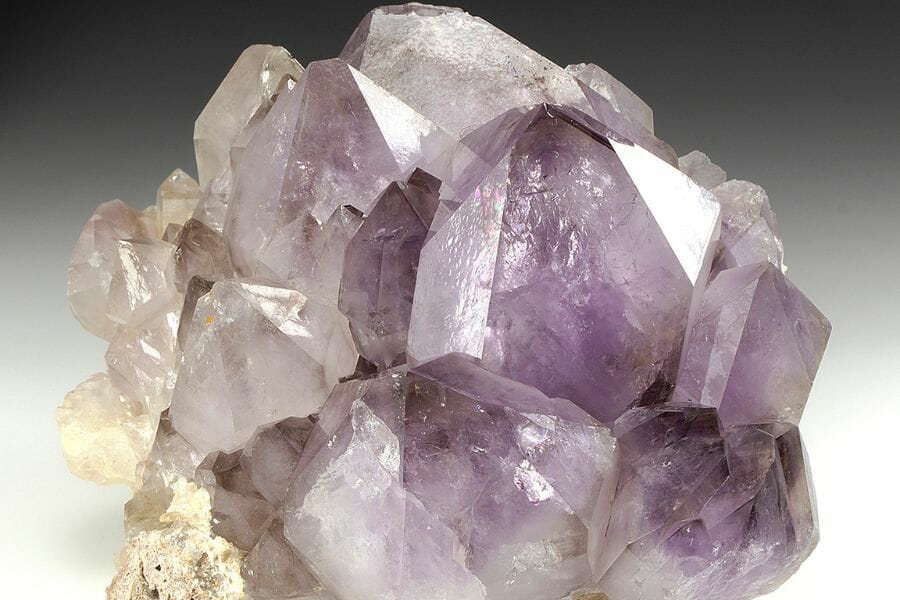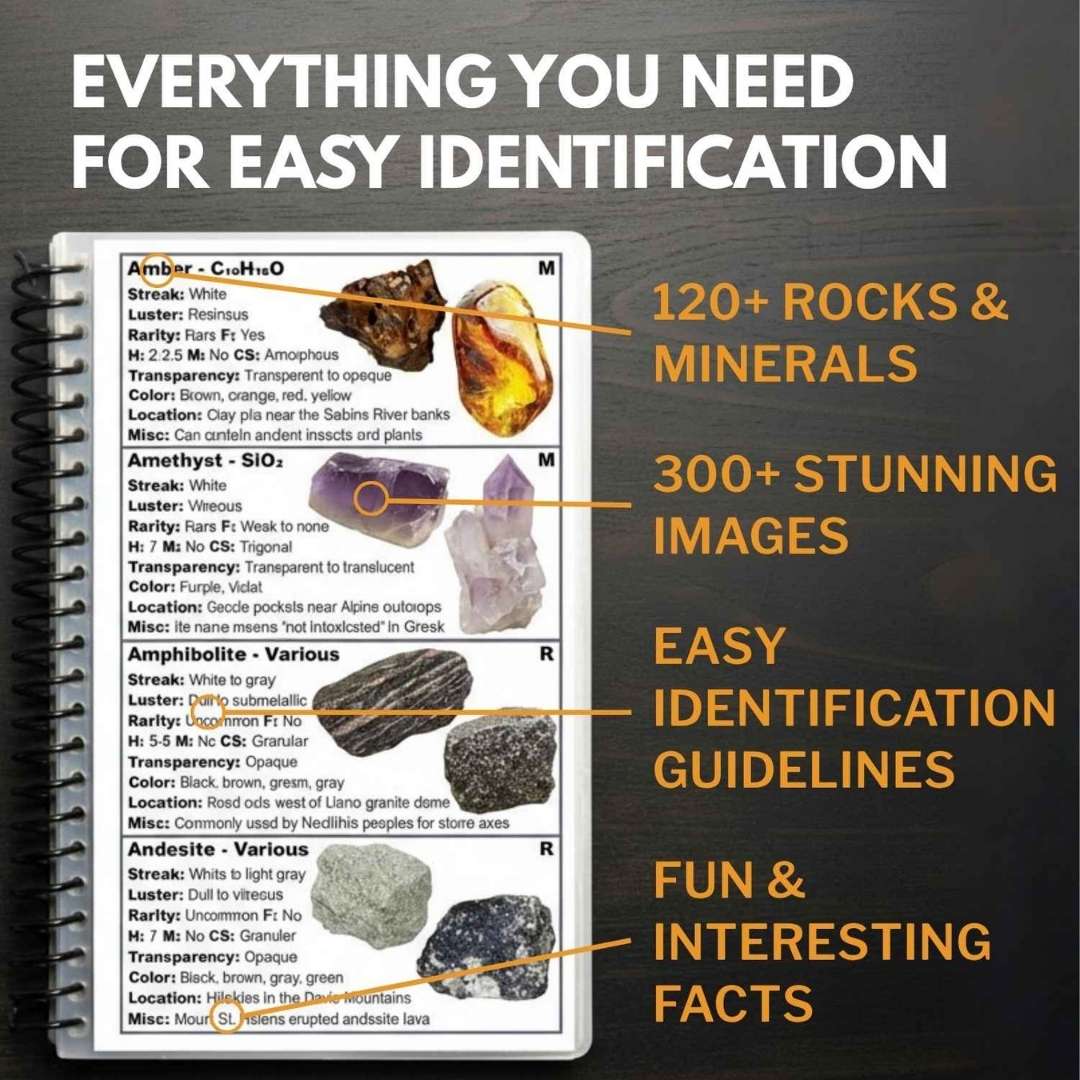Searching for amethysts in Texas can be quite the adventure! Without the proper guidance, it can feel like looking for a needle in a haystack. These gorgeous purple gems are not exactly lying around on every street corner.
But fear not, fellow treasure seekers, because we’ve got good news. We’ve uncovered some hidden gems of information that will help you strike amethyst gold in the Lone Star State!
We’ve scoured the land, talked to the experts, and compiled a list of great options to help any amethyst hunter find success. With a bit of guidance and a lot of determination, you’ll be on your way to uncovering the enchanting world of amethysts in no time!
To make the most of your search, bring Rock Chasing’s Texas Rocks & Minerals Identification Field Guide with you. It makes identifying your finds fast and easy, saving hours of guesswork and ensuring you never walk past a piece of amethyst without realizing it.
What is Texas Amethyst?
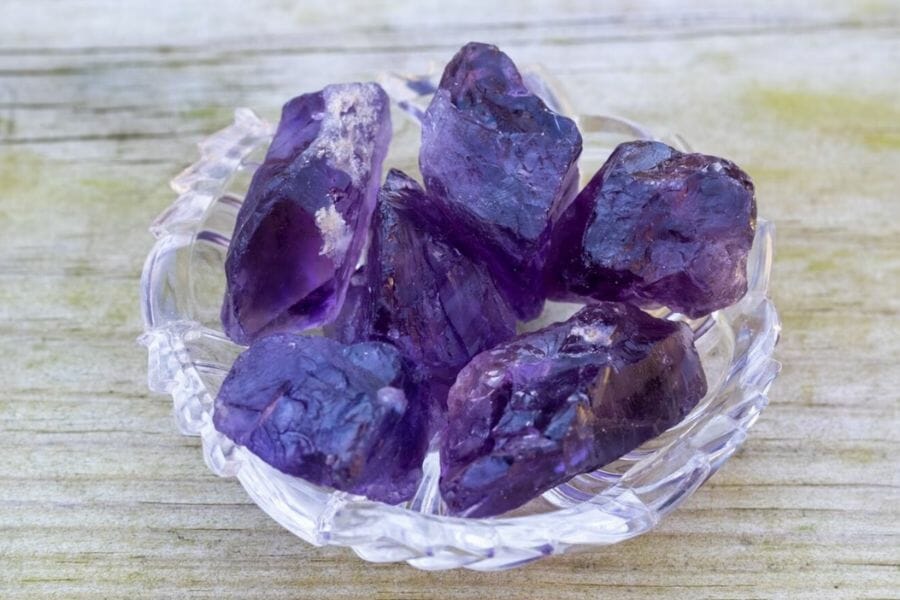
Amethysts are indeed a sight to behold. They’re like little drops of heaven on Earth. Their vibrant purple hue, ranging from delicate lavender to deep royal shades, is a feast for the eyes.
It’s like staring into a cosmic galaxy trapped in a gemstone. The way they catch the light and sparkle is mesmerizing.
The Different Types Of Amethyst And What They Look Like
Amethyst is a kind of quartz that forms in various geological settings, such as within volcanic rocks or in cavities of granites. These different environments contribute to the diverse appearances and types of this beautiful mineral.
The variety seen in amethyst is due to trace elements and impurities within the crystal structure. Elements like iron and manganese can alter the hue, leading to the beautiful spectrum of purples and other colors found in these crystals.
Brandberg Amethyst
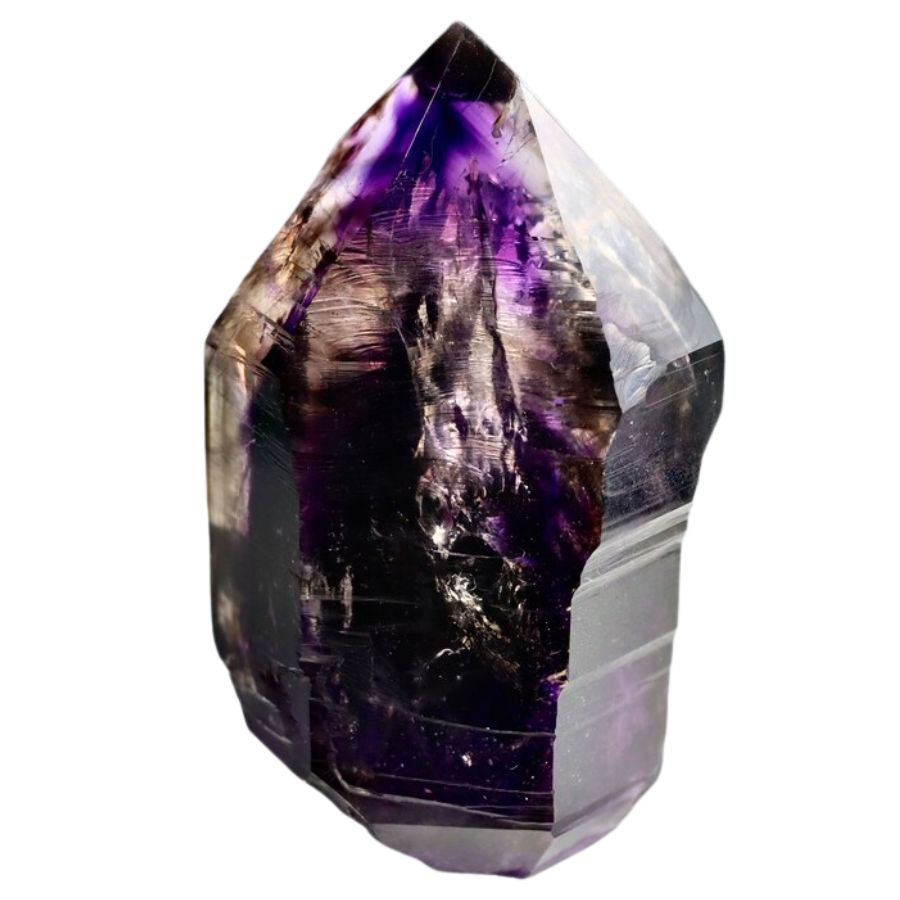
Brandberg amethyst is a captivating variety of quartz, renowned for its unique blend of elements like silicon dioxide, iron, and trace amounts of other minerals.
These components come together to form a crystal that not only holds geological significance but also showcases a striking array of hues and features.
The appearance of Brandberg amethyst is truly remarkable, characterized by its color range from deep purples to vibrant lilacs.
The varying shades are a result of the iron content within the crystal structure, which can fluctuate, leading to diverse color intensities and patterns in each specimen.
Brandberg amethyst stands out for its inclusion patterns and the presence of phantom crystals within its structure.
These internal “ghosts” are formed by layers of other minerals, offering a glimpse into the crystal’s growth history and adding to its allure for those fascinated by the wonders of the natural world.
You've probably walked past some incredible rocks and minerals. You need this guide 👇👇👇
We've all come across a cool rock that we could have sworn was rare or valuable but couldn't tell what it was.
If you're not 100% confident that you know every rock and mineral in Texas this guide is for you.
The Texas Rocks & Minerals Field Guide helps you ID what you find in seconds, from Hill Country agates to Llano granite, with crisp photos, simple charts, and zero fluff.
→ Grab your copy today and spot your next gem before anyone else does.
What this guide unlocks:
🧭 Confidence in the field — ID rocks fast and move on to the next find
🎒 Lightweight and waterproof — built for trails, not coffee tables
🌅 Weekend adventures — find treasures on rivers, ranches, and roadsides
🤠 Texas pride — explore the real geological beauty of your state
🔥 Motivation — every trip outside feels like a hunt for hidden gems
Ametrine
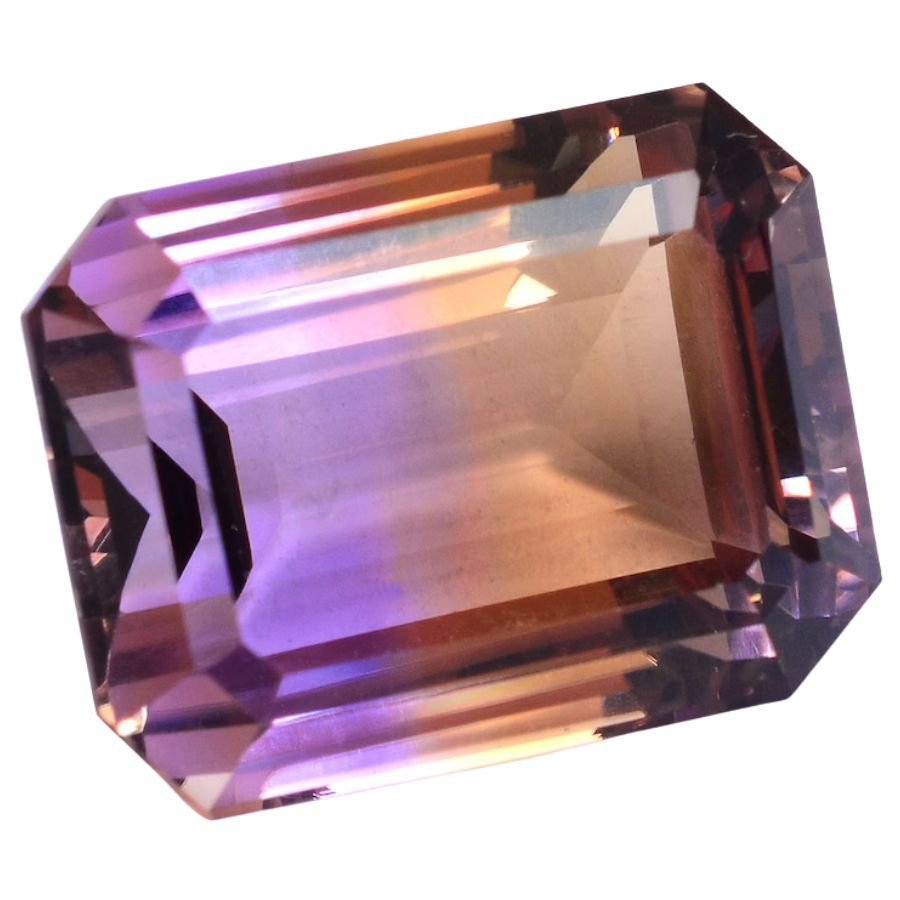
Ametrine is an intriguing mineral that captures the imagination of those interested in rocks and minerals. This unique gem is a combination of two quartz varieties: amethyst and citrine.
The beauty of ametrine lies in its striking coloration, which ranges from a blend of vibrant purple and golden yellow.
This color variation is a result of differing oxidation states of iron within the crystal, influenced by temperature and radiation exposure during formation.
Ametrine is notable for its distinct zoning of colors, where purple and yellow hues can be clearly seen in the same crystal. This feature, combined with its unique composition, sets ametrine apart from different kinds of amethyst.
Chevron Amethyst
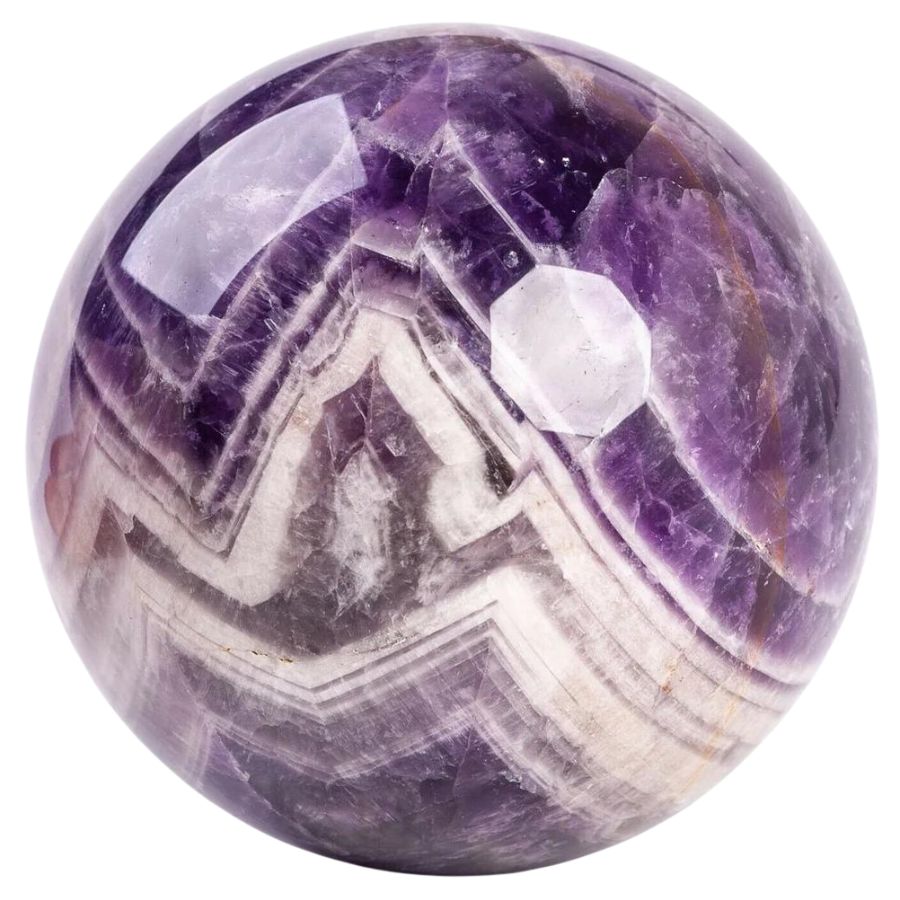
Chevron amethyst is a captivating type of amethyst known for its distinctive pattern. It’s easily recognized by its unique V-shaped or chevron patterns, which are a combination of deep purple and white or clear quartz layers.
These patterns and color variations are due to differences in iron content and other impurities in the layers, resulting in the striking contrast seen in chevron amethyst.
Chevron amethyst is not only beautiful but also a subject of interest for its formation process. The alternating layers of colors provide a visual record of the crystal’s growth history, making it a fascinating example for geological study.
Auralite
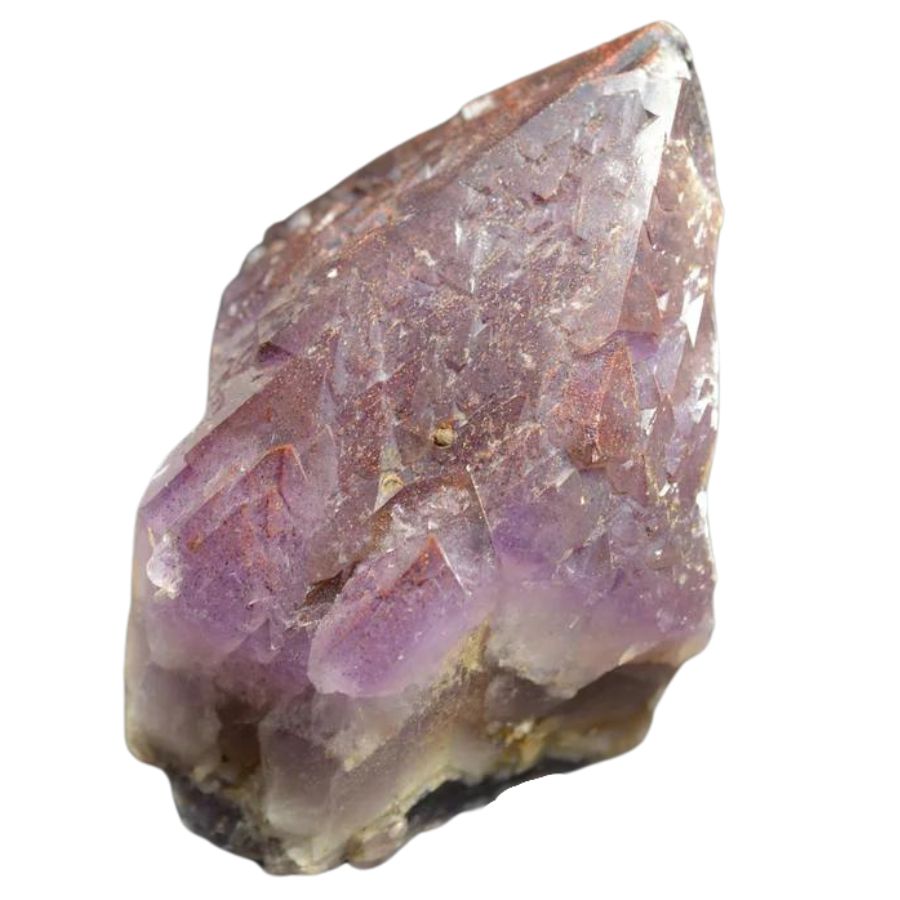
Auralite is an intriguing type of mineral that’s a combination of amethyst and several other trace minerals. Its composition includes silicon dioxide from amethyst, along with a mixture of elements like iron, copper, and titanium.
This mineral’s appearance is quite distinct, often showing a deep purple hue similar to what amethyst looks like, but with additional layers or inclusions of other colors.
These variations in color are due to the various trace minerals present in auralite, each contributing to its unique and colorful display.
A standout feature of auralite is the presence of multiple minerals within a single specimen, sometimes including up to 23 different types.
This mix not only gives auralite its diverse color range but also makes it a fascinating subject for those studying minerals and their properties.
Prasiolite
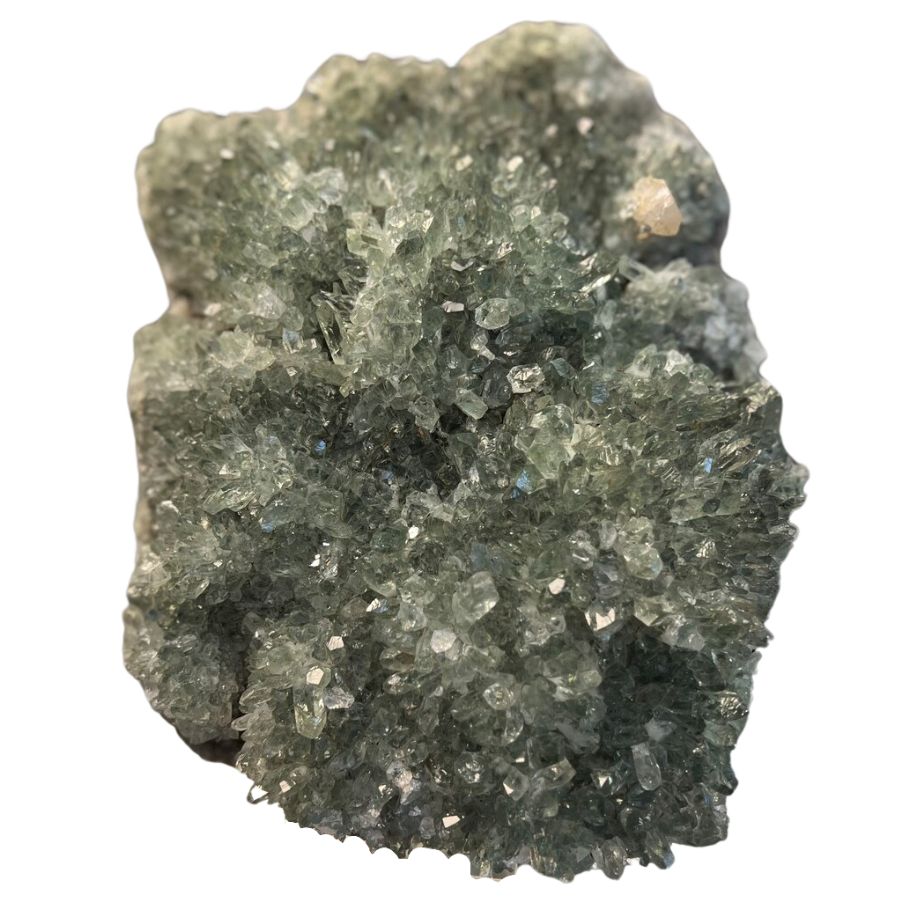
Prasiolite is an interesting variety of quartz. It often contains traces of iron, which play a key role in giving prasiolite its unique color.
This mineral is known for its beautiful green color, which can range from a light, almost transparent green to a deeper, more olive shade.
The green color of prasiolite is usually the result of heat treatment, either occurring naturally in the earth or artificially, transforming certain types of amethyst or yellowish quartz into prasiolite.
Naturally-occurring prasiolite is rare, as most available prasiolite is created through artificial means.
Cacoxenite amethyst
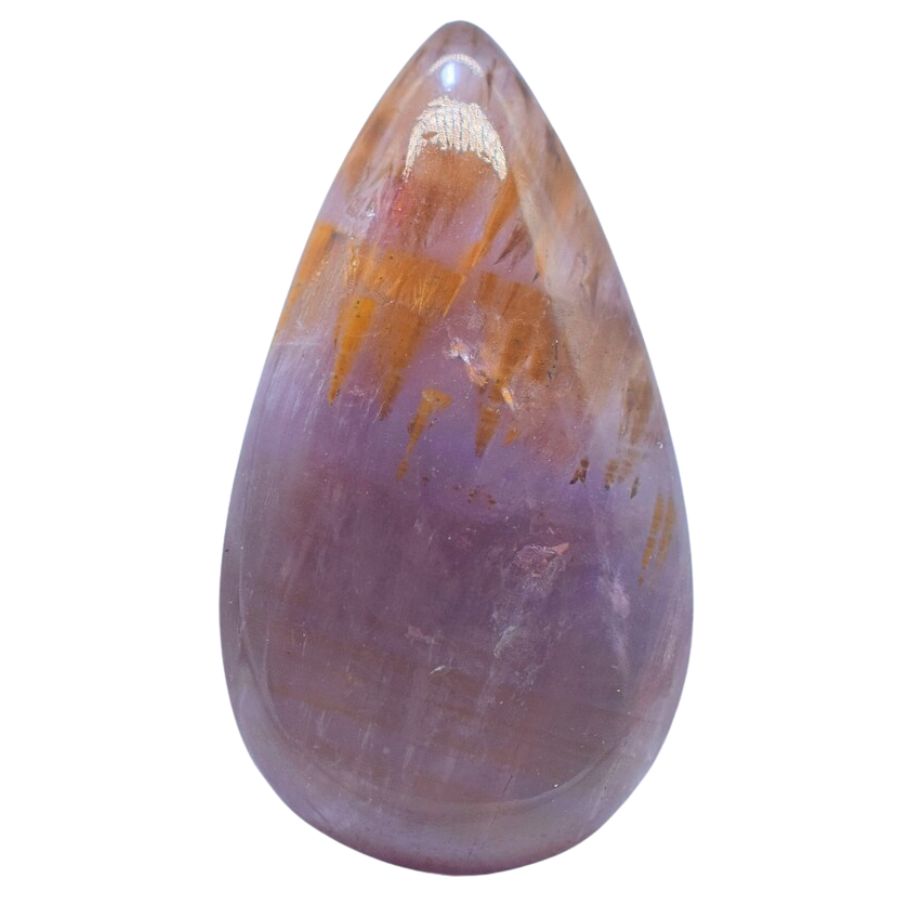
Cacoxenite is an intriguing mineral primarily composed of iron, aluminum, and phosphate, along with other elements like oxygen and hydrogen. This combination of elements gives cacoxenite its unique chemical makeup and properties.
Cacoxenite typically exhibits a striking golden-yellow to brownish-yellow color. This coloration is mainly due to the presence of iron in its structure, which imparts the rich hues that characterize this mineral.
A notable feature of cacoxenite is that it often forms as an inclusion within other minerals, such as amethyst, creating a beautiful contrast.
These inclusions of cacoxenite can appear as radiating or feathery formations, adding an intricate and fascinating aspect to the host mineral.
Where you can find cacoxenite amethyst
Cacoxenite amethyst can be found in the United States, Germany, and Brazil.
Phantom Amethyst
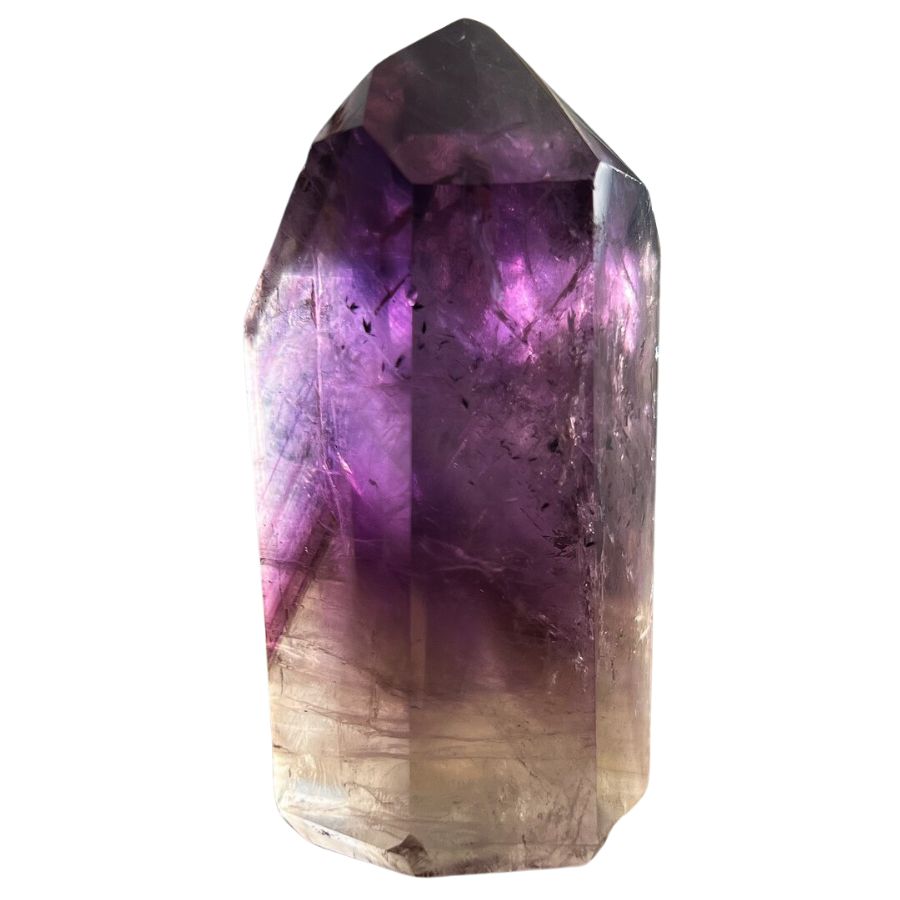
Phantom amethyst is a fascinating variety of amethyst. It stands out due to the presence of “phantoms” – ghost-like inclusions within its structure, which give it a distinct and layered look.
In phantom amethyst, one can observe a range of colors from deep purples to lighter hues, often appearing in layers or as phantom shapes within the crystal.
These color variations are typically due to trace amounts of iron and other minerals that get trapped during the crystal’s growth, influencing its final color.
Phantom amethyst provides a visual record of the crystal’s growth history. The crystal outlines and layers within the stone are formed by pauses in the crystal’s growth, offering a glimpse into geological processes over time.
Where you can find phantom amethyst
There are notable sources of phantom amethyst in Brazil, Madagascar, and the United States. In the United States, phantom amethyst is often discovered in states like Arizona, North Carolina, and Colorado.
Pink Amethyst
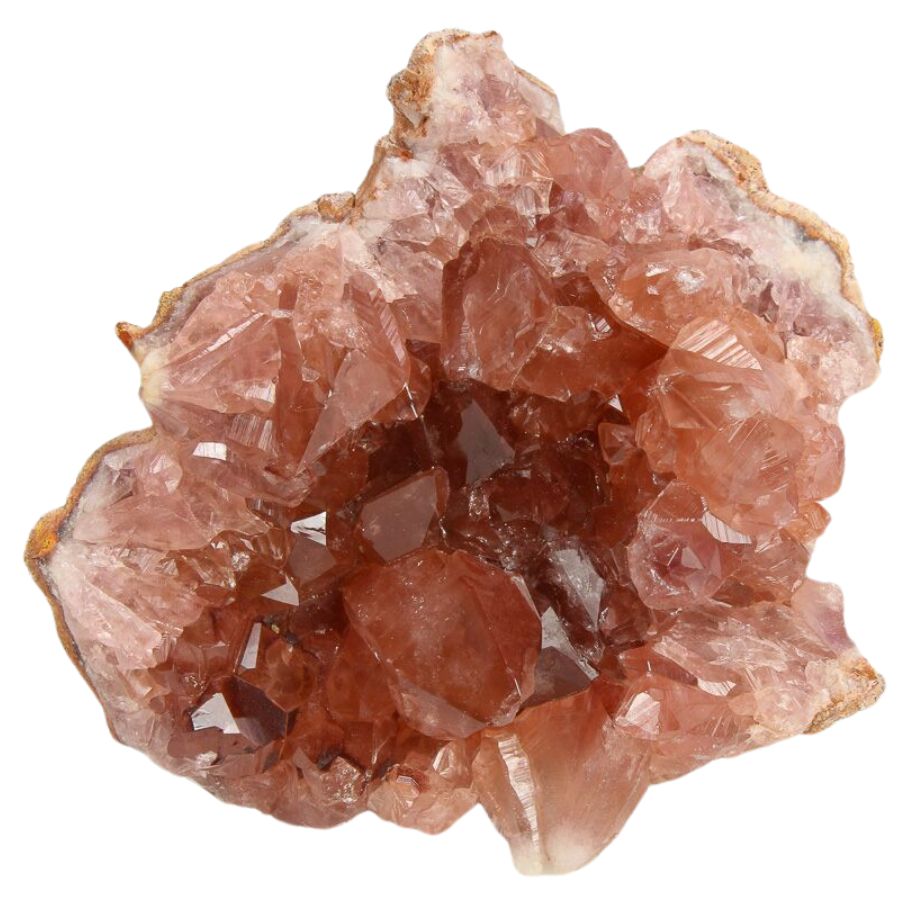
Pink amethyst is a unique and relatively rare variety of the common mineral amethyst. The presence of trace elements, particularly iron, contributes to its distinct pink hue.
The appearance of pink amethyst ranges from a delicate, light pink to a deeper, more vivid pink.
This variation in color is largely due to the concentration and distribution of iron within the crystal, which affects how light interacts with the mineral.
Pink amethyst is its often found in geodes or clusters, where multiple crystals grow together in a captivating display.
Amethyst Geodes
Amethyst geodes are fascinating natural formations, with traces of iron giving them their famous purple color. These geodes form in volcanic rocks and are essentially hollow, lined with amethyst crystals.
A key feature of amethyst geodes is their crystal-lined cavity, which creates a stunning natural display. When you look inside an amethyst geode, you’ll see a range of purple hues, from light lavender to deep violet.
The color variation is due to the amount of iron and the specific conditions under which the crystals formed, such as temperature and the presence of other trace elements.
Geodes can vary greatly in size, from small enough to fit in your hand to large enough to stand in, and each one is unique in its crystal formation and color pattern.
Where you can find amethyst geodes
Amethyst geodes are commonly found in Brazil and Uruguay. In the United States, they can also be found in places like Arizona and Oregon.
Cactus Amethyst
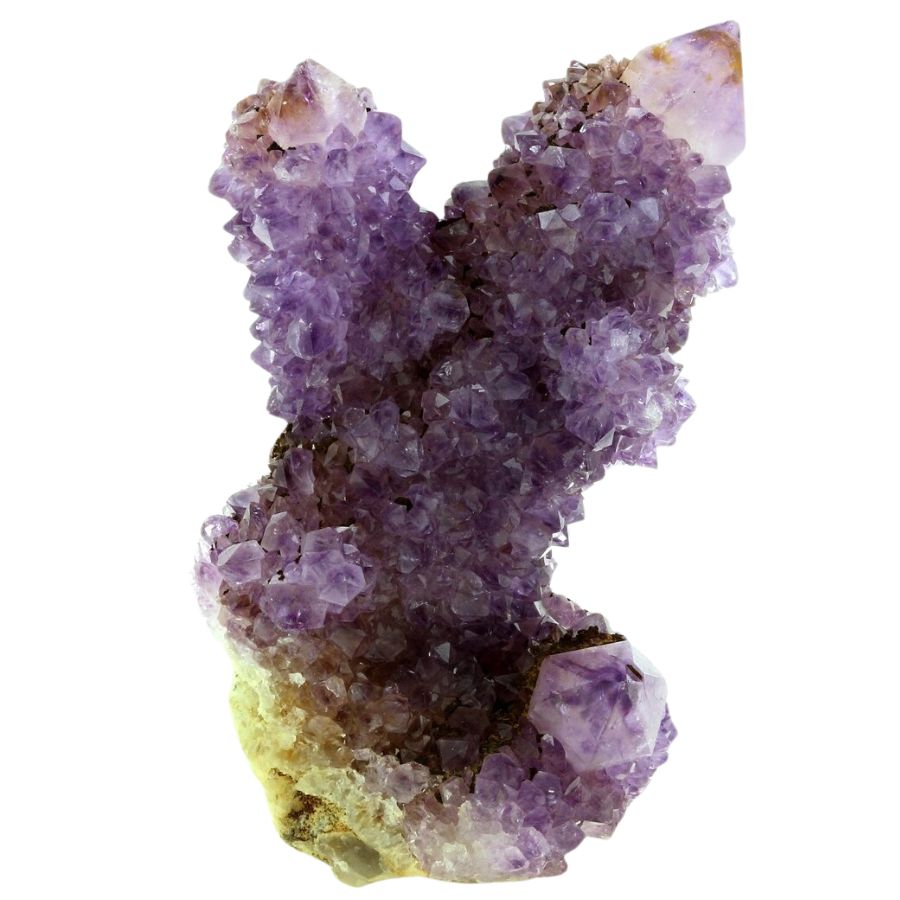
Cactus amethyst is also known as spirit quartz. Its unique structure is enriched with additional minerals, which contribute to its distinctive appearance.
This type of amethyst is characterized by a central quartz crystal covered in smaller crystal growths, giving it a spiky, cactus-like appearance.
The color ranges from pale lilac to deep purple, with the variations largely influenced by the amount of iron and other trace elements within the crystals.
A notable feature of cactus amethyst is the way the smaller crystals radiate outward from the central crystal.
This formation not only creates a stunning visual effect but also makes each piece of cactus amethyst a unique and fascinating specimen.
Regarding the price of amethyst, it can vary significantly based on the size, quality, and depth of color. While smaller, less vibrant pieces are relatively affordable, larger specimens with deep, rich colors can be quite valuable.
Scepter Amethyst
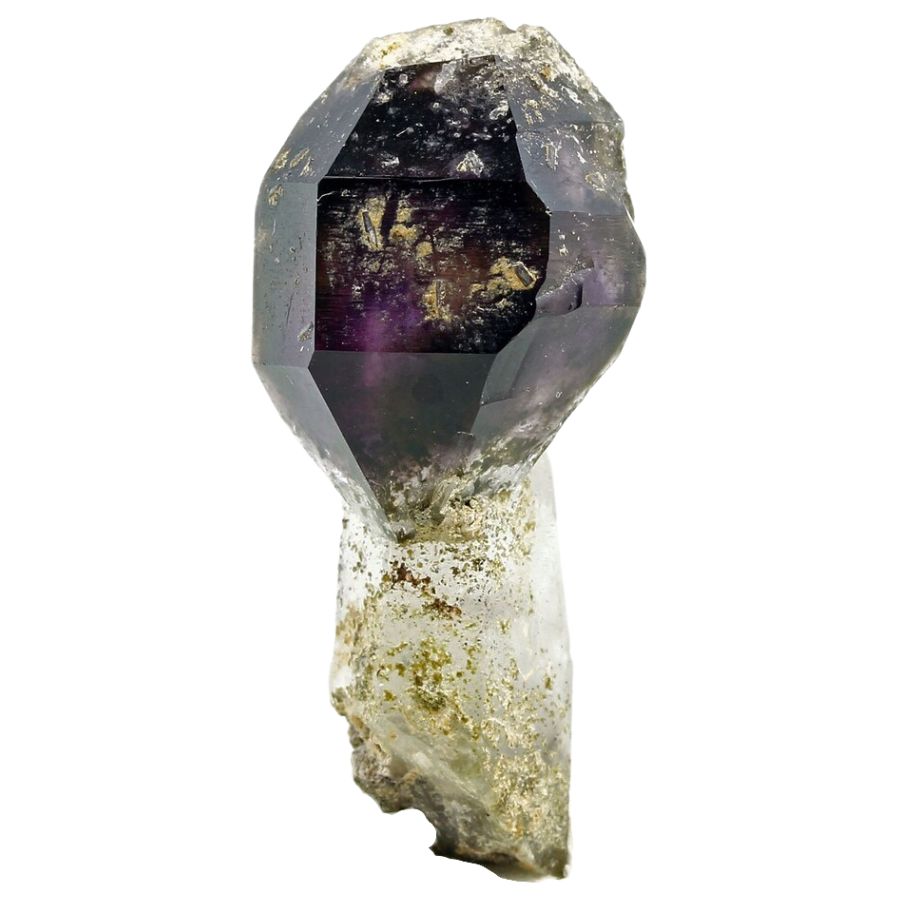
Scepter amethyst gets its name from its distinctive scepter-like formation, where a larger crystal cap sits atop a smaller crystal stem.
The color variations in scepter amethyst are influenced by the amount of iron and other trace elements within the crystal, coupled with the specific conditions under which it formed.
A key feature of scepter amethyst is its symbolic scepter shape, representing a crystal formation process where a second phase of growth occurs on an already-formed crystal base. This creates a striking and regal scepter-like appearance.
Where you can find scepter amethyst
Scepter amethyst can be found in several locations around the world, with notable spots including Brazil, Madagascar, and Zambia.
In the United States, areas like Washington State and North Carolina are also known for their scepter amethyst discoveries.
Smoky Amethyst
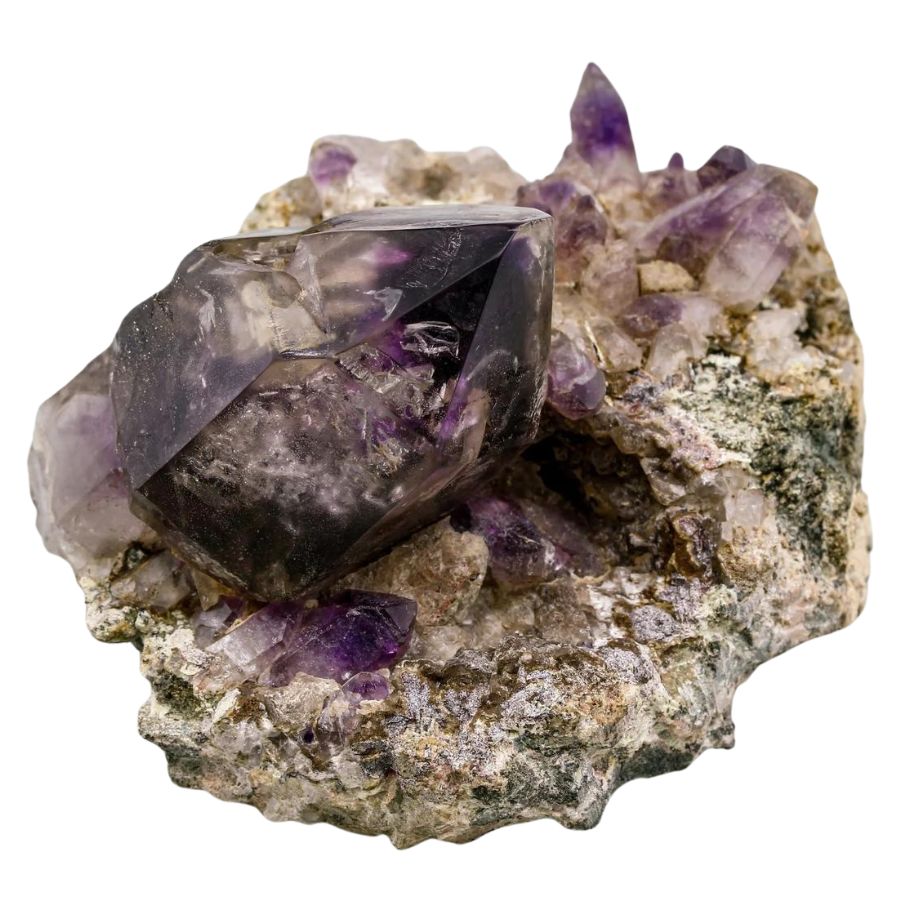
Smoky amethyst is a unique variation among amethyst types that combines features of both smoky quartz and amethyst. The presence of trace elements like iron and aluminum gives it its unique coloration.
This mineral exhibits a blend of smoky brown and purple hues, creating a captivating visual effect. This is due to natural irradiation and the varying amounts of impurities, which influence the depth and intensity of both the smoky and purple colors.
A notable feature of smoky amethyst is its dual-tone appearance, which is not commonly found in other quartz varieties.
- The deep experience and understanding of our team about the area
- Recommendations from local groups and clubs
- How easy it is to get the a particular location
- Safety and potential hazards when collecting
- Weighing private and public locations
- The ability for both experienced and novice amethyst enthusiasts to find great samples
With these factors in mind we’ve been able to put together a fantastic list that just about anyone can use!
The Tools You Will Need
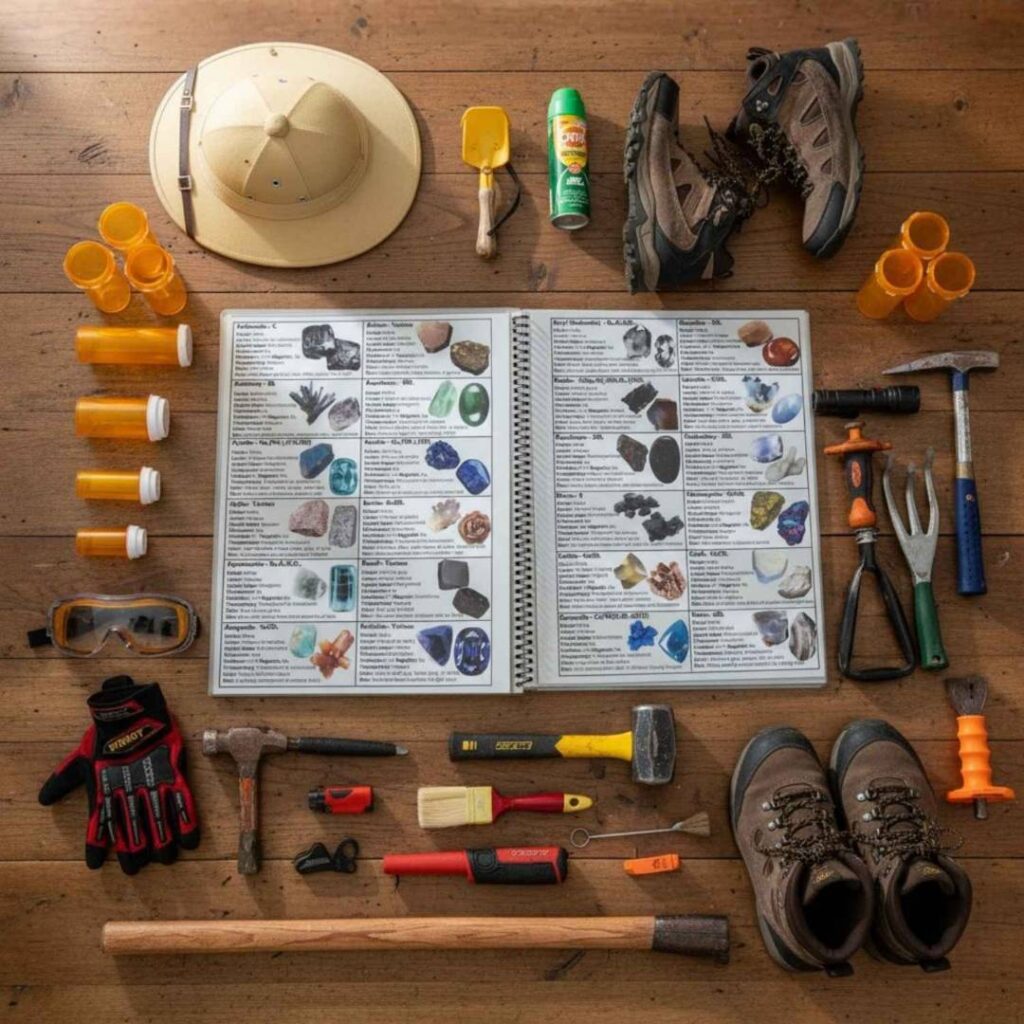
Looking for amethyst in Texas starts with being prepared. The right tools make searching easier, safer, and a lot more rewarding. You don’t need a full setup or expensive gear! Just a few essentials that help you dig, spot, and carry your finds with confidence.
A Trusted Field Identification Guide – Essential
A good field guide is the most valuable thing you can carry. It teaches you what amethyst actually looks like in the ground, how to tell it apart from similar stones, and what kinds of rock it tends to form in.
A guide like this takes the guesswork out of collecting so you spend more time finding and less time wondering.
Rock Chasing’s Texas Rocks & Minerals Identification Field Guide is built for the job. It’s waterproof, rugged enough for the field, and filled with clear color photos of over a hundred Texas minerals.
It’s a quick reference that keeps you from walking past something special or misidentifying a great find.
You can see HERE why it’s so popular with thousands of Texas rockhounds.
Small Pick – Essential
A small pick lets you dig with precision in rocky soil and chip away at hard spots without damaging what’s underneath. It’s especially helpful when you’re working around crystal clusters or tight crevices. The control it gives you is what keeps your best finds intact.
Water Spray Bottle – Recommended
Amethyst can look dull until it’s cleaned off, and a quick spray of water can bring out the color immediately. It also helps you spot crystal patterns and see fractures before you collect. Simple, light, and surprisingly useful in the field.
Collection Bag or Bucket – Recommended
You’ll need something solid to hold your finds. A small canvas bag, pouch, or bucket keeps your specimens protected and easy to carry. It also saves your pockets from filling with dust and sharp edges.
Safety Glasses – Essential
When you’re striking or chipping rock, fragments can fly without warning. Safety glasses protect your eyes from debris and let you work without hesitation. They’re cheap, comfortable, and something you never regret bringing.
The Best Spots To Find Amethyst in Texas
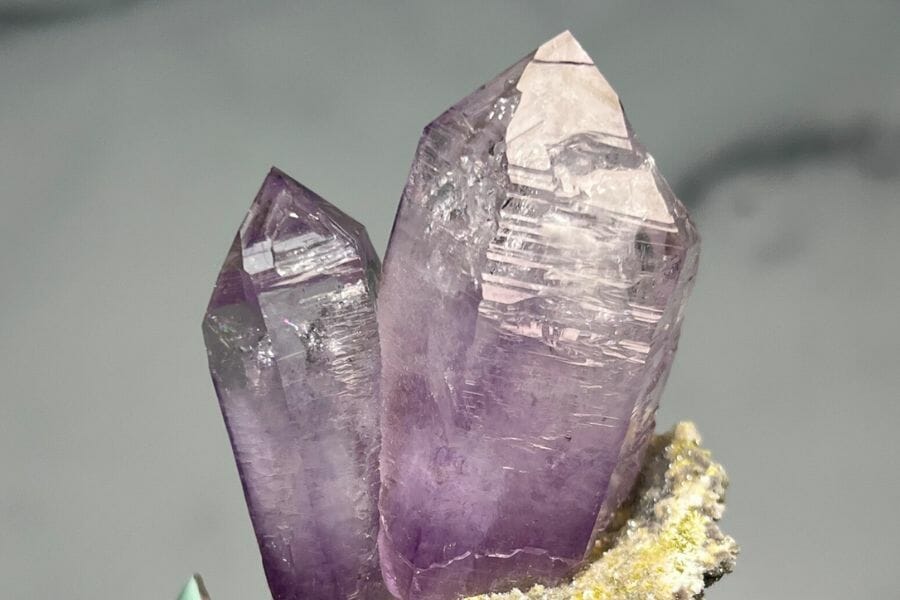
Here are our top recommendations for finding amethyst in the state. You can find gems in Texas in many exciting places, but only a few are perfect for locating amethysts. Although some of these locations aren’t well-known, we investigated there and discovered intriguing possibilities.
Always Confirm Access and Collection Rules!
Before heading out to any of the locations on our list you need to confirm access requirements and collection rules for both public and private locations directly with the location. We haven’t personally verified every location and the access requirements and collection rules often change without notice.
Many of the locations we mention will not allow collecting but are still great places for those who love to find beautiful rocks and minerals in the wild without keeping them. We also can’t guarantee you will find anything in these locations since they are constantly changing.
Always get updated information directly from the source ahead of time to ensure responsible rockhounding. If you want even more current options it’s always a good idea to contact local rock and mineral clubs and groups
Agua Fria Ranch
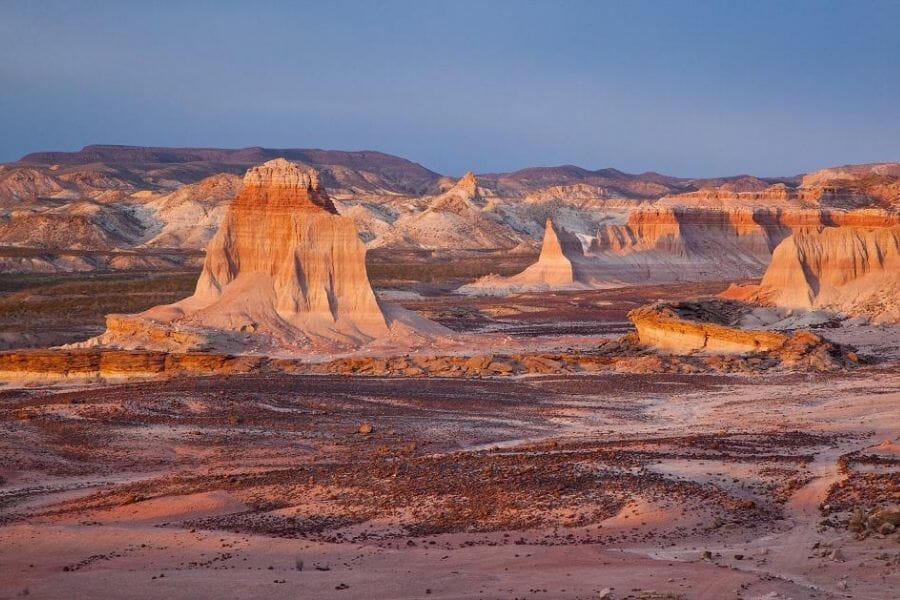
Agua Free Ranch is a true gem when hunting for amethysts. This picturesque location boasts a rugged landscape that is a haven for rockhounds and adventure seekers.
The geology of Agua Free Ranch is like a hidden treasure chest. Beneath its soil lie rich deposits of quartz, which serves as the host rock for amethyst formation. It’s like a perfect breeding ground for these stunning purple crystals. The ranch is known for its diverse geological formations, including ancient volcanic flows and fault zones, providing the ideal conditions for amethysts to form and flourish.
Agua Free Ranch is relatively easy to get to. Situated just a short drive from major cities, it offers a convenient escape into nature without sacrificing comfort. You can pack your rock hammer and picnic basket, hop in your car, and be surrounded by the beauty of nature in no time.
Before bringing your treasures home, make sure you’ve studied the most recent Texas collecting regulations.
Where we found amethyst at Agua Fria Ranch
At Agua Fria Ranch in Texas, you can find amethysts in various locations across the property. One area to explore is the rocky outcrops and hillsides. These natural formations provide an excellent habitat for amethysts to form.
Keep your eyes peeled for exposed quartz veins and clusters, as they often contain pockets of amethyst crystals waiting to be discovered.
If you want REAL results finding incredible rocks and minerals in Texas you need one of these 👇👇👇
Finding the coolest rocks in Texas isn’t luck, it's knowing what to look for. Thousands of your fellow rock hunters are already carrying Rock Chasing field guides. Maybe it's time you joined the community.
Lightweight, mud-proof, and packed with clear photos, it’s become the go-to tool for anyone interested discovering what’s hidden under our red dirt.
Join them, and make your next rockhounding trip actually pay off.
📘 Order the Texas Field Guide Now →
What makes it different:
🚙 Field-tested across Texas rivers, ranchlands, and roadcuts.
📘 Heavy duty laminated pages resist dust, sweat, and water.
🧠 Zero fluff — just clear visuals and straight-to-the-point info.
📍 Find hidden gems like Blue Topaz, Texas agate, and petrified wood fast.
⭐ Rated 4.8★ by real collectors who actually use it in the field.
Amethyst Hill
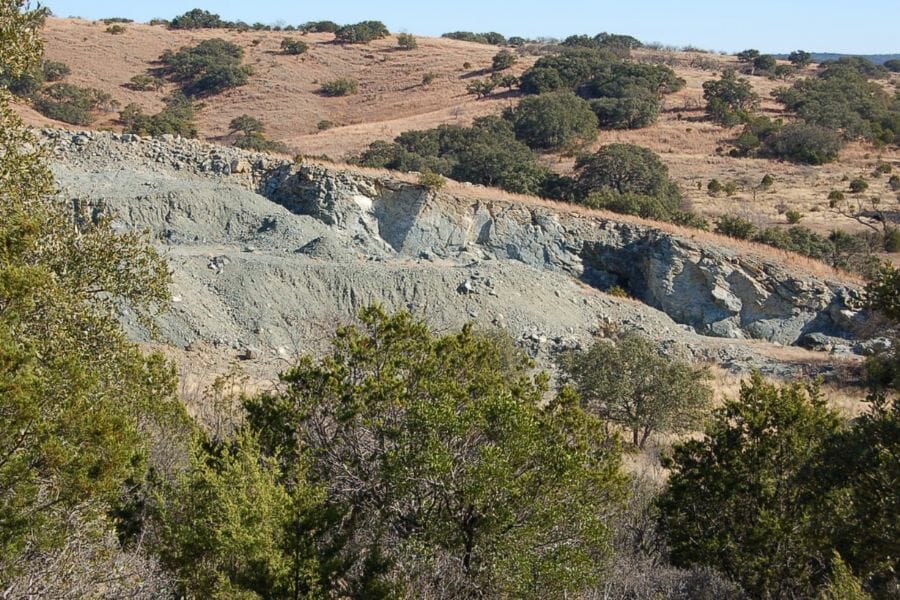
Amethyst Hill is a true haven for amethyst enthusiasts and nature lovers. This beautiful location has gained a well-deserved reputation as a prime spot for finding amethysts, and it’s not hard to see why.
The geological composition of Amethyst Hill is a key factor in its allure. The hill comprises ancient volcanic rocks and minerals, providing an ideal environment for forming amethyst crystals. These volcanic origins have blessed the area with rich deposits of quartz, acting as a host rock for the stunning purple amethysts that lie within.
The accessibility of Amethyst Hill adds to its charm. Situated within convenient reach of major cities, it offers a rewarding adventure without the hassle of a long journey. The hill welcomes rock enthusiasts, amateur prospectors, and families alike to experience the thrill of amethyst hunting.
Where we found amethyst at Amethyst Hill
One good location to investigate is the exposed cliffs and rocky outcrops. These natural formations hold the potential for hidden amethyst pockets. Take your time to carefully examine the rocks, paying close attention to fractures and crevices where amethyst crystals may be nestled.
The cliffs often offer a captivating display of geological wonders, and within their intricate layers, you might find your prized amethyst specimen. You can find out how much amethyst is worth in our detailed guide.
Davis Mountains State Park
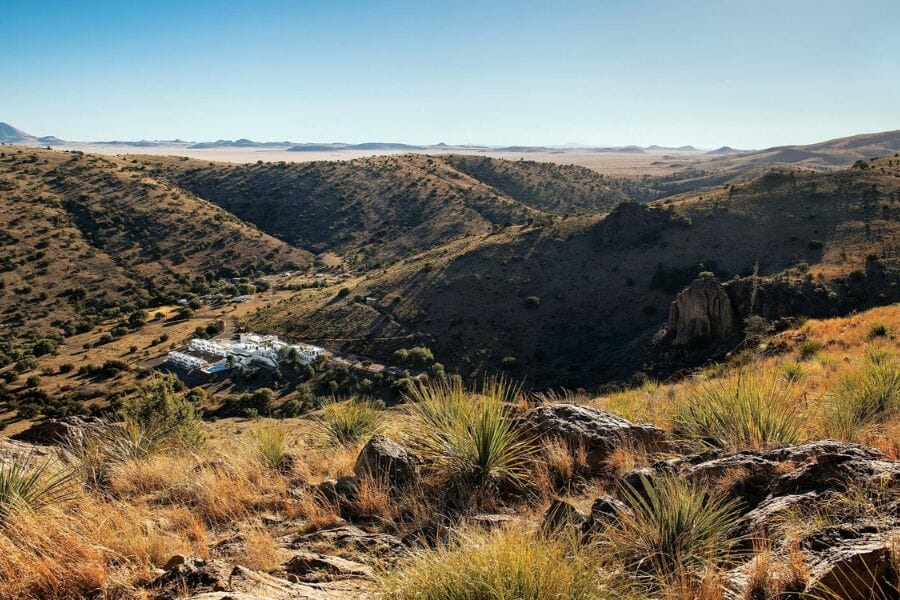
What sets Davis Mountain State Park apart is its unique geological composition. The park is situated atop an ancient volcanic formation, which has created the perfect conditions for forming amethyst crystals.
The volcanic activity in the area resulted in the deposition of rich quartz veins, acting as a host rock for the beautiful purple amethysts that await discovery. The park’s geological heritage adds an extra layer of excitement and wonders to the amethyst-hunting experience.
Davis Mountain State Park offers well-maintained trails that wind through scenic landscapes, allowing visitors to explore the park’s geological wonders while searching for amethyst treasures. The park’s tranquil atmosphere and serene surroundings make it a peaceful haven to escape the hustle and bustle of daily life and immerse oneself in the captivating world of amethysts.
Where we found amethyst at Davis Mountains State Park
Exploring the park’s creek beds and washouts can lead to amethyst discoveries. Over time, the flowing water has eroded the surrounding rocks, exposing and carrying away amethysts downstream.
Scan the creek banks and search through gravel and sediment deposits, as these areas often harbor beautiful amethyst specimens naturally transported by the water.
Quitman Mountains
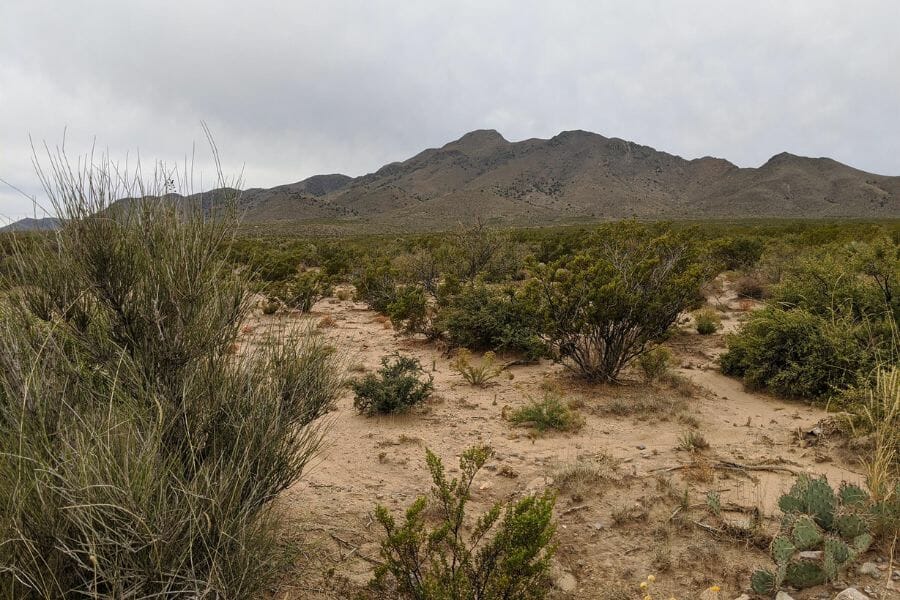
The Quitman Mountains hold an air of mystery and allure, drawing amethyst enthusiasts to their slopes. This captivating mountain range is widely recognized as a fruitful location for amethyst hunting, and there are compelling reasons why it’s considered a prime spot for uncovering these breathtaking purple gems.
Another factor contributing to the Quitman Mountains’ appeal is their remoteness and unspoiled nature. This untamed wilderness offers a pristine setting where amethyst hunters can immerse themselves in the rugged beauty of nature. The seclusion and tranquility of the mountains provide a sense of adventure, where the thrill of the hunt combines with the serenity of the surroundings.
Where we found amethyst at Quitman Mountains
Venture along the mountain trails and paths, keeping a keen eye on the ground as you wander. Amethysts can be scattered across the landscape, exposed through natural processes or left behind by previous explorers.
You should also pay attention to the creek banks of Quitman Mountains, where the water has deposited gravel and sediment. These areas often hold hidden treasures, with amethysts gleaming amidst the mix of stones.
Sierra Blanca Peaks
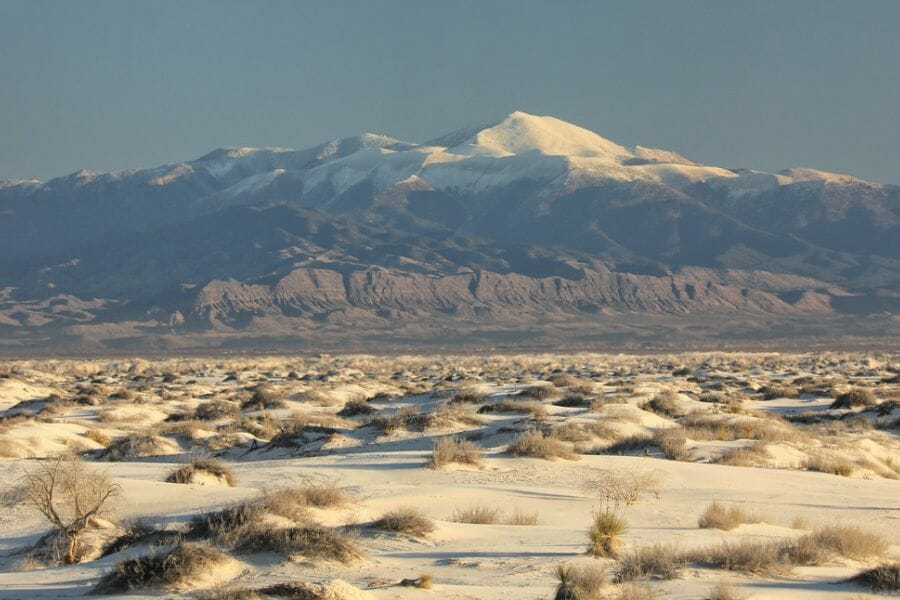
Because of its geological composition, Sierra Blanca Peaks is an excellent spot for amethyst hunting. These peaks comprise ancient volcanic rocks and mineral-rich formations, providing an ideal environment for forming amethyst crystals. Over time, the intense geological activity and the interplay of minerals have created the perfect conditions for amethysts to take shape within the mountains’ depths.
Regarding amethyst discoveries, Sierra Blanca Peaks have yielded remarkable specimens. The amethysts here showcase a range of hues and crystal formations, each a unique marvel of nature.
Where we found amethyst at Sierra Blanca Peaks
You can search on the rocky slopes and outcrops of Sierra Blanca Peaks. These natural formations are often treasure troves for amethyst enthusiasts. Take your time to carefully examine the rocks, paying close attention to fractures, crevices, and pockets where amethyst crystals may be nestled.
Amethysts can be scattered throughout the area, exposed through natural processes.
You've probably walked past some incredible rocks and minerals. You need this guide 👇👇👇
We've all come across a cool rock that we could have sworn was rare or valuable but couldn't tell what it was.
If you're not 100% confident that you know every rock and mineral in Texas this guide is for you.
The Texas Rocks & Minerals Field Guide helps you ID what you find in seconds, from Hill Country agates to Llano granite, with crisp photos, simple charts, and zero fluff.
→ Grab your copy today and spot your next gem before anyone else does.
What this guide unlocks:
🧭 Confidence in the field — ID rocks fast and move on to the next find
🎒 Lightweight and waterproof — built for trails, not coffee tables
🌅 Weekend adventures — find treasures on rivers, ranches, and roadsides
🤠 Texas pride — explore the real geological beauty of your state
🔥 Motivation — every trip outside feels like a hunt for hidden gems
Other Great Places To Mine For Amethyst in Texas
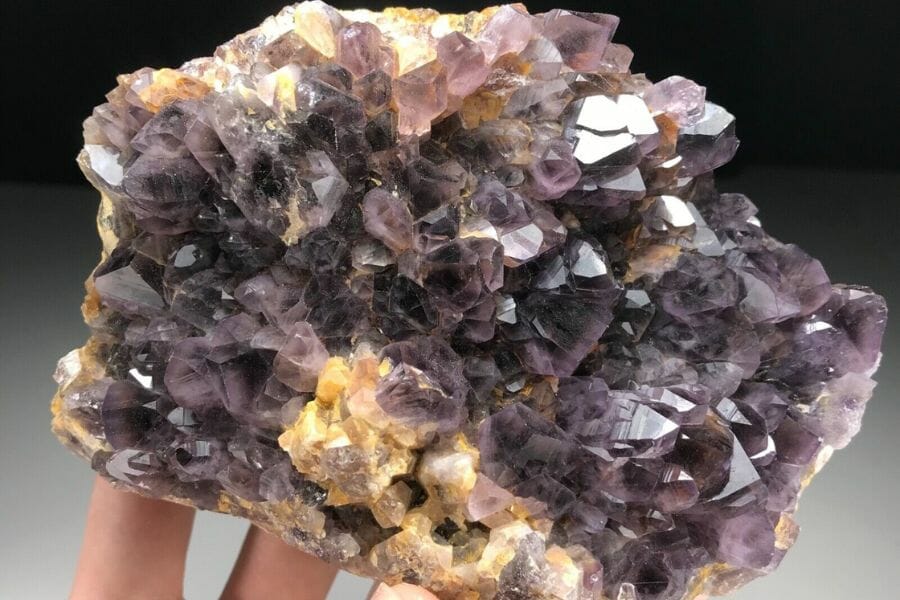
Our recommendations by county
Despite having already outlined our best selections for locations to search for amethyst crystals in Texas, we can still suggest many other locations. Below, we’ve sorted them by county to make things simpler.
| County | Location |
| Brewster | Woodward Ranch |
| Brewster | Needle Peak |
| Karnes | Butler Mine |
| Llano | Baringer Hill Mine |
Additional areas you can find amethyst
Due to Texas’ size, we want to help you be successful with your search. It’s crucial to look for the key and concentrate on locations where amethysts are frequently discovered.
Mines and mine dumps
Mines and mine dumps serve as fantastic locations for avid collectors to find amethyst treasures, offering a unique opportunity to uncover geological and historical specimens. These sites provide a glimpse into the rich mineral deposits of the past and present, making them veritable treasure troves for amethyst enthusiasts.
Mining activities expose the Earth’s crust layers, revealing veins and pockets rich in amethysts. This allows collectors to directly access areas where amethysts have been naturally formed, increasing the likelihood of finding exceptional specimens.
Mine dumps, which consist of discarded rock material from mining operations, hold hidden gems waiting to be discovered. As mining operations extract valuable minerals, including amethysts, discarded rocks and debris often contain overlooked or discarded specimens.
Rivers and riverbanks
Rivers and their picturesque riverbanks are natural havens that hold a hidden treasure trove of amethysts, making them alluring destinations for collectors seeking these gorgeous purple gems. River flowing waters and dynamic landscape create ideal conditions for discovering exquisite amethyst specimens.
One of the critical reasons rivers and riverbanks are fruitful locations for amethyst hunting is the natural erosion process. Over time, the relentless movement of water wears away at the surrounding rocks, exposing amethysts and carrying them downstream. As a result, riverbanks become repositories of amethysts that have been gently deposited by the water’s flow, presenting collectors with an opportunity to find remarkable specimens.
Streams and creeks
The dynamic nature of streams and creeks concentrates amethysts in specific areas. The flowing water’s gentle currents and settling patterns cause heavier amethysts to settle in specific locations, creating pockets of concentration.
By carefully exploring the gravel, sediments, and crevices along the streambed, collectors can discover hidden amethysts gleaming amongst the natural surroundings. Amethyst hunting in these serene waterways allows collectors to connect with nature, immersing themselves in the soothing sounds of trickling water while pursuing these gorgeous gems.
Common Amethyst-Hunting Questions
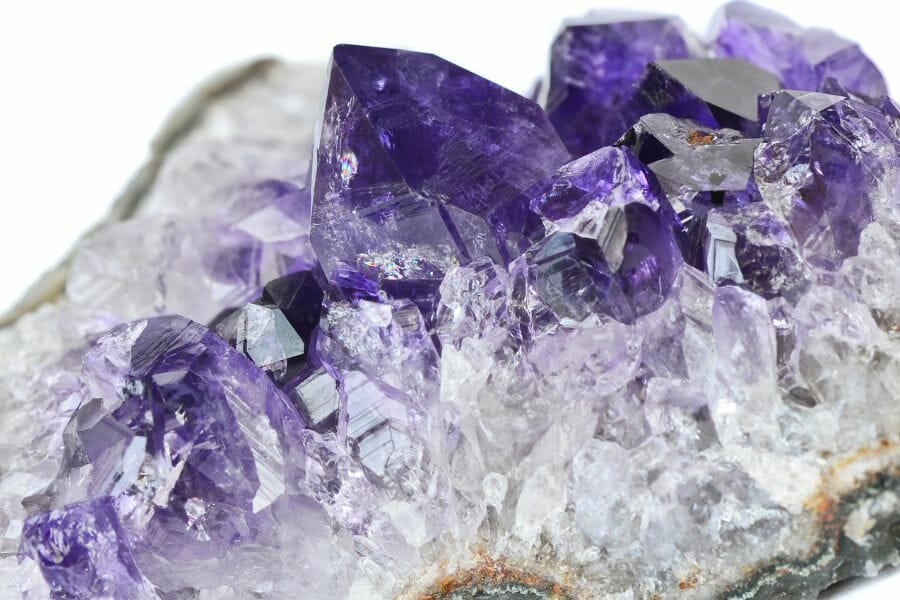
The following frequently asked questions about amethysts in Texas must be addressed.
Where can you find amethyst geodes in Texas?
Although amethyst geodes are not commonly found in Texas, there are a few rock shops where you can get various kinds.
Is it illegal to collect amethyst in Texas?
Texas allows amethyst collection as long as you abide by local laws. If you’re in a public space, abide by any applicable laws. If you’re on private land, make sure you have permission.
The Best Places To Buy Amethyst In Texas

Spending all day in the woods searching for amethysts is not for everyone. Sometimes, you only need a stunning collection piece or display that stands out. This is a list of rock stores where you can buy amethyst crystals.
- Crystal Gallery – 4012 Alameda Ave, El Paso, TX 79905
- Crystal Shop – 3501 Ranch Rd 620 S, Bee Cave, TX 78738
- Crystal Source – 441 W Bedford Euless Rd, Hurst, TX 76053
- Nature’s Rock – 2010 FM2673 Suite 2, Canyon Lake, TX 78133
- Nature’s Treasures Texas – 4103 N Interstate Hwy 35, Austin, TX 78722
Additional places to find amethyst in nearby states
Check out our guides for nearby states if you’ve already tried all of our suggestions above or if you’re planning a trip outside the state:
If you have any recommendations for our list, please leave a comment below!

